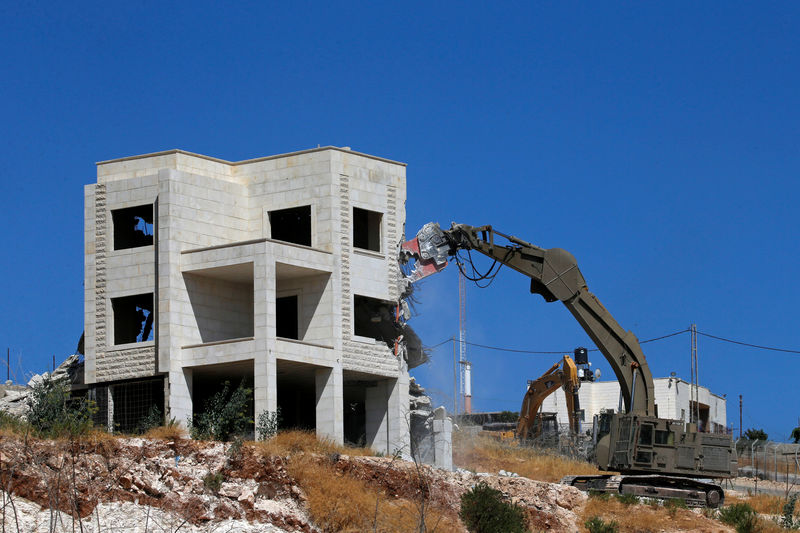By Ali Sawafta
SUR BAHER, West Bank (Reuters) - Israeli forces began demolishing Palestinian homes near a military barrier on the outskirts of Jerusalem on Monday, in the face of protests and international criticism.
Bulldozers accompanied by hundreds of Israeli police and soldiers moved into Sur Baher, a Palestinian village on the edge of East Jerusalem in an area that Israel captured and occupied in the 1967 Middle East War.
Palestinians fear the razing of buildings near the fence will set a precedent for other towns along the route of the barrier, which runs for hundreds of kilometres around and through the Israeli-occupied West Bank.
The demolition is the latest round of protracted wrangling over the future of Jerusalem, home to more than 500,000 Israelis and 300,000 Palestinians, and sites sacred to Judaism, Islam and Christianity.
Israeli forces cut through a wire section of the barrier in Sur Baher under cover of darkness early on Monday, and began clearing residents.
Bulldozers and mechanical diggers began tearing down homes on both sides of the barrier as security forces prepared a partly constructed nine-storey building for demolition.
"They have been evacuating people from their homes by force and they have started planting explosives in the homes they want to destroy," said Hamada Hamada, a community leader.
Israel's Supreme Court ruled in June that the structures violated a construction ban. The deadline for residents to remove the affected buildings, or parts of them, was Friday.
But Palestinian owners said their buildings lay within areas run by the Palestinian Authority, which exercises limited self-rule in the Israeli-occupied West Bank.
"I built this house stone by stone. It was my dream to live in this house. Now I am losing everything," said Fadi al-Wahash, 37, his voice breaking as a bulldozer destroyed his unfinished three-floor house.
"I had a permit to build from the Palestinian Authority. I thought I was doing the right thing," he said.
Israeli Internal Security Minister Gilad Erdan said 700 police and 200 soldiers were involved.
"Despite an order from the military commander, the residents there are making their own law, building. There are hundreds of illegal structures," he told Israel's Army Radio.
"To my regret there is no sufficient governance there. But it is not just that there are hundreds of structures there -- several dozens of them sit almost on the route of the separation fence, endangering the security forces that operate there."
Palestinian Prime Minister Mohammad Shtayyeh said the Palestinians would complain to the International Criminal Court about the demolitions in Sur Baher.
"The cabinet condemns this grave aggression. This is a continuation of the forced displacement of the people of Jerusalem from their homes and lands -- a war crime and a crime against humanity," Shtayyeh said.
DEMOLITION PREPARATIONS
Sur Baher's political geography is complicated. Parts of the sprawling village lie inside the municipal boundary of Israeli-occupied East Jerusalem and parts outside the barrier, in the West Bank. But some lies in between: just outside the Jerusalem line but still on the Israeli side of the barrier.
Palestinian officials said some of the threatened structures lie within their areas of control.
The Palestine Liberation Organization issued a statement in the build-up to the demolition accusing the Israeli court of aiming "to set a precedent to enable the Israeli occupying forces to demolish numerous Palestinian buildings located in close proximity" to the barrier.
Jamie McGoldrick, the United Nations humanitarian coordinator, and other U.N. officials called on the Israeli authorities last week to halt the demolition plans. They said 17 Palestinians faced displacement from the plans to level 10 buildings, including dozens of apartments.
The European Union issued a statement saying: "The continuation of this policy undermines the viability of the two-state solution and the prospect for a lasting peace."
But the Israeli Supreme Court's three-judge panel ruled unanimously in favour of demolition. "The petitioners took the law into their own hands when they began and continued building structures without receiving a special permit from the military commander," it said.
The court said construction close to the barrier could provide cover for attackers.
Israel credits the obstacle -- projected to be 720 km (450 miles) long when complete -- with stemming Palestinian suicide bombings and shooting attacks. Palestinians call it a land grab designed to annex parts of the West Bank, including Israeli settlements.
The International Court of Justice in The Hague issued an advisory opinion in 2004 that building the barrier on occupied territory was "contrary to international law".

Israel dismissed the non-binding decision as politically motivated and says the barrier played a key role in drastically reducing the number of attacks.